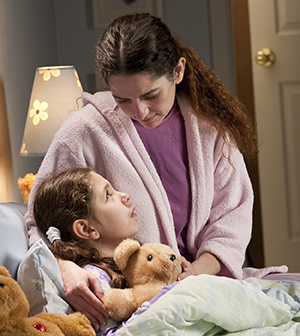If you had a mild concussion (a head injury), watch closely for signs of problems during the first 48 hours after the injury. Follow the healthcare provider’s advice about recovering at home. Use the tips on this handout as a guide.
Note: You should not be left alone after a concussion. If no adult can stay with the injured person, let the healthcare provider know.
Have someone call
The first 48 hours
Don’t take medicine unless approved by your healthcare provider. Try placing a cold, damp cloth on your head to help relieve a headache.
-
Ask the healthcare provider before using any medicines.
-
Don't drink alcohol or take sedatives or medicines that make you sleepy.
-
Don't return to sports or any activity that could cause you to hit your head until all symptoms are gone, and your healthcare provider says it's OK. A second head injury before fully recovering from the first one can lead to serious brain injury.
-
If the child is without symptoms when resting, then a slow increase in activities can begin. Each step should take approximately 24 hours. Only move to the next step if the child remains without symptoms. If symptoms happen again, the child should return to the previous step that didn't result in symptoms. It should take about 7 days or more to go back to normal activities following this method.
-
Don't do activities that need a lot of concentration or a lot of attention, including video games. This will let your brain rest and heal faster.
-
Check with your healthcare provider that it's OK to return to regular physical and mental activities.
Tips about sleeping
For the first day or 2, it may be best not to sleep for long periods of time without being checked for alertness. Follow the healthcare provider's directions.
☐ Have someone wake you every ____ hours for the next ____ hours. They should ask you questions to check for alertness.
☐ OK to sleep through the night.
When to call the healthcare provider
Call the healthcare provider if any of the following occur:
-
Vomiting. Some vomiting is common, but tell the provider about any vomiting.
-
Clear or bloody drainage from the nose or ear
-
Constant drowsiness or trouble waking up
-
Confusion or memory loss
-
Blurred vision or any vision changes
-
Inability to walk or talk normally
-
Increased weakness or problems with coordination
-
Constant, unrelieved headache that becomes more severe
-
Changes in behavior or personality
-
High-pitched crying in infants
-
Signs of stroke, such as paralysis of parts of the body
-
Uncontrolled movements suggesting a seizure
-
Loss of bowel or bladder control


